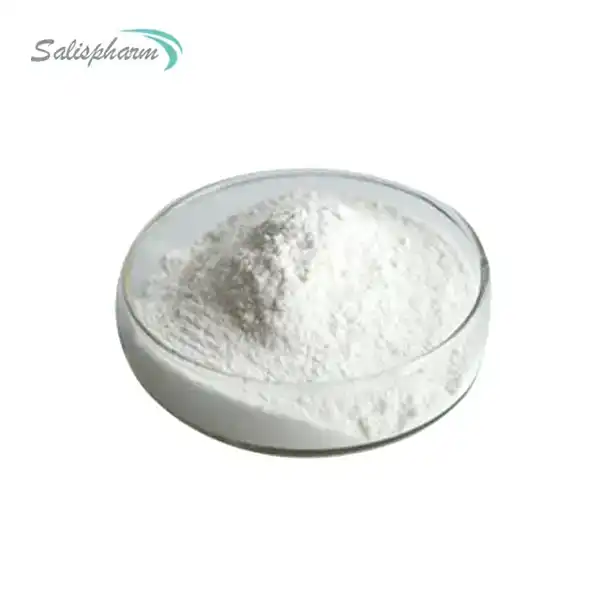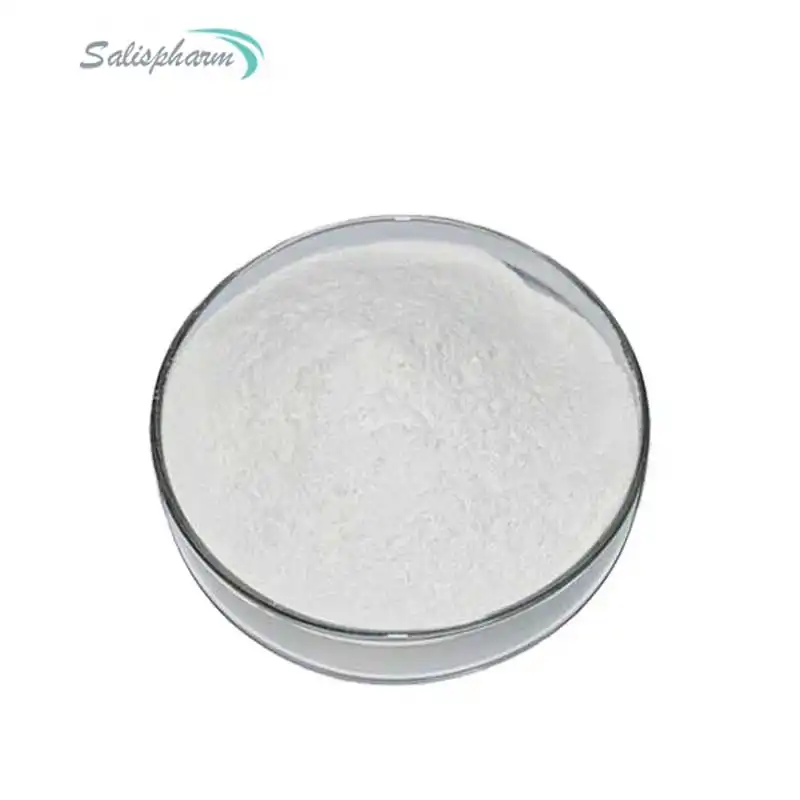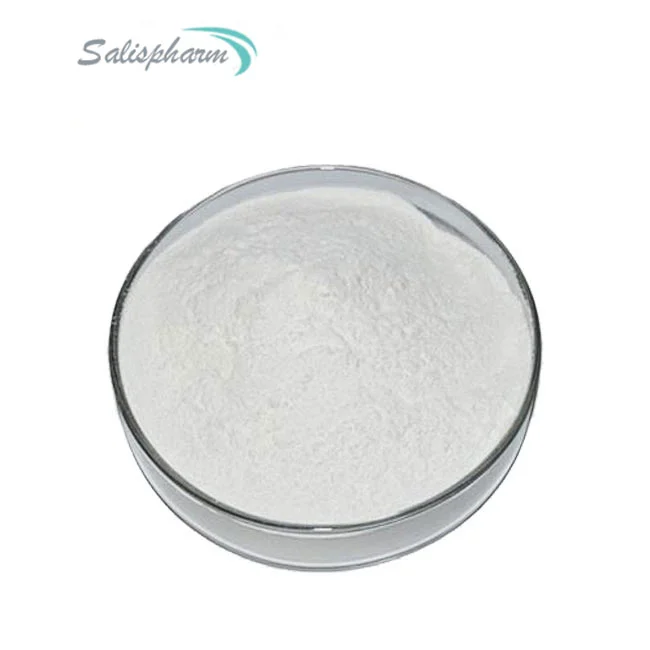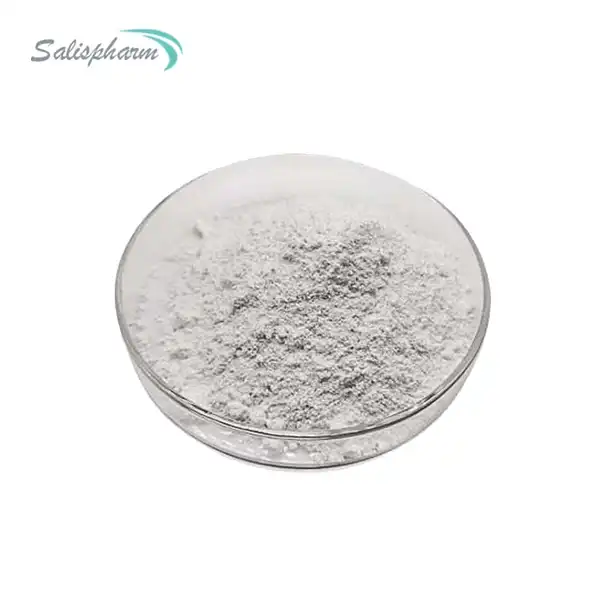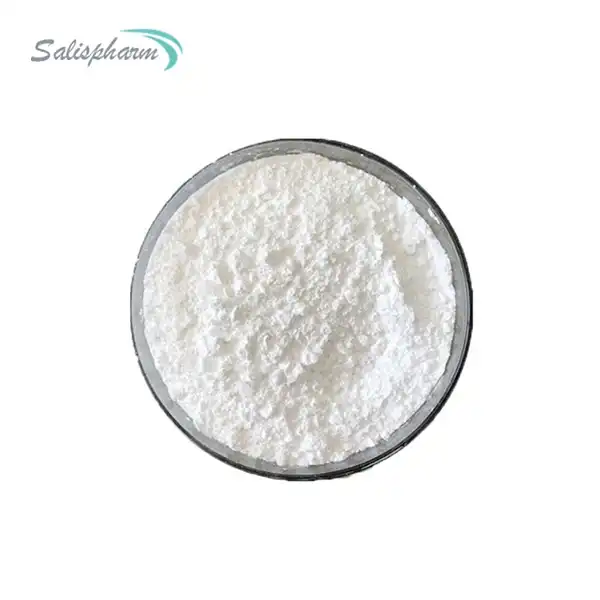Hydrochlorothiazide is a commonly prescribed diuretic medication used to treat high blood pressure and fluid retention. While this medication can be highly effective, it's important to be aware of potential interactions with certain foods. Understanding which foods to avoid or limit while taking hydrochlorothiazide can help maximize the medication's effectiveness and minimize potential complications. This blog post will explore the dietary considerations for individuals taking hydrochlorothiazide, focusing on foods that may interact with the medication or affect its performance.
What is Hydrochlorothiazide Powder and How Does it Work?
Hydrochlorothiazide powder is the active ingredient in a type of diuretic medication known as a thiazide diuretic. This medication works by increasing the amount of water and salt expelled from the body as urine. By reducing fluid volume in the blood vessels, hydrochlorothiazide helps lower blood pressure and alleviate edema (swelling) caused by various medical conditions.
The powder form of hydrochlorothiazide is typically compounded into tablets or capsules for oral administration. It's important to note that the powder form is not meant for direct consumption and should only be handled by licensed pharmacists or medical professionals during the medication preparation process.
Hydrochlorothiazide works primarily on the kidneys, specifically in the distal convoluted tubule. It inhibits the sodium-chloride symporter, preventing the reabsorption of sodium and chloride ions. This action leads to increased excretion of sodium, chloride, and water, resulting in decreased blood volume and, consequently, lower blood pressure.
The medication's effects on fluid balance can also impact other electrolytes in the body, particularly potassium. This is why healthcare providers often monitor potassium levels in patients taking hydrochlorothiazide and may recommend dietary adjustments or potassium supplements if necessary.
Understanding the mechanism of action of hydrochlorothiazide is crucial for appreciating why certain dietary considerations are important while taking this medication. The interaction between the drug and various foods can affect its efficacy, the body's electrolyte balance, and overall health outcomes.
Can You Eat Bananas While Taking Hydrochlorothiazide?
One of the most common questions patients have regarding Hydrochlorothiazide Powder and diet is whether they can consume bananas. This concern arises because hydrochlorothiazide can lower potassium levels in the body, and bananas are well-known for their high potassium content.
Contrary to what some might assume, eating bananas while taking hydrochlorothiazide is generally not only safe but can be beneficial. Here's why:
1. Potassium Balance: Hydrochlorothiazide is a potassium-wasting diuretic, meaning it can cause the body to lose potassium through increased urination. Bananas, being rich in potassium, can help replenish these lost stores.
2. Blood Pressure Management: Both hydrochlorothiazide and potassium play roles in managing blood pressure. While the medication works to lower blood pressure by reducing fluid volume, potassium helps relax blood vessel walls, potentially enhancing the medication's effects.
3. Nutrient Density: Bananas offer more than just potassium. They're a good source of fiber, vitamin C, vitamin B6, and other nutrients that contribute to overall health.
However, it's crucial to maintain a balanced approach:
1. Moderation is Key: While bananas can be part of a healthy diet for most people taking hydrochlorothiazide, consuming them in moderation is important. Excessive potassium intake could potentially lead to hyperkalemia (high potassium levels), especially in individuals with kidney problems.
2. Individual Variations: The effect of Hydrochlorothiazide Powder on potassium levels can vary from person to person. Some individuals may experience significant potassium loss, while others might not.
3. Medical Supervision: It's always best to consult with your healthcare provider about your specific dietary needs. They may recommend regular blood tests to monitor your potassium levels and adjust your diet or medication accordingly.
4. Diverse Potassium Sources: While bananas are an excellent source of potassium, it's beneficial to obtain this mineral from a variety of foods. Other potassium-rich options include sweet potatoes, spinach, beans, and avocados.
5. Timing Considerations: If you're concerned about the interaction between bananas and hydrochlorothiazide, you might consider eating bananas at a different time of day than when you take your medication. However, this is generally not necessary for most people.
In conclusion, for most individuals taking hydrochlorothiazide, eating bananas in moderation is not only safe but can be part of a healthy, balanced diet that supports the medication's effectiveness. As always, personalized medical advice from your healthcare provider should guide your dietary choices while on this medication.
How Does Grapefruit Interact with Hydrochlorothiazide?
Grapefruit and grapefruit juice are known to interact with various medications, and hydrochlorothiazide is no exception. Understanding this interaction is crucial for patients taking this medication to ensure its effectiveness and avoid potential complications.
The interaction between grapefruit and hydrochlorothiazide is complex and multifaceted:
1. Enzyme Inhibition: Grapefruit contains compounds called furanocoumarins, which can inhibit an enzyme in the small intestine called CYP3A4. This enzyme is responsible for metabolizing many drugs, including Hydrochlorothiazide Powder. When this enzyme is inhibited, it can lead to higher levels of the medication in the bloodstream.
2. Increased Absorption: Some studies suggest that grapefruit juice may increase the absorption of hydrochlorothiazide in the gut. This could potentially lead to higher concentrations of the drug in the body, intensifying its effects.
3. Potassium Levels: Both hydrochlorothiazide and grapefruit can affect potassium levels in the body. While hydrochlorothiazide tends to lower potassium levels, grapefruit may have a slight potassium-sparing effect. This interaction could potentially lead to imbalances in potassium levels.
4. Blood Pressure Effects: Grapefruit has been shown to have some blood pressure-lowering properties on its own. When combined with hydrochlorothiazide, this effect could be amplified, potentially leading to excessively low blood pressure in some individuals.
5. Timing Considerations: The effects of grapefruit on drug metabolism can last for several days. This means that even if you don't consume grapefruit at the same time as taking your medication, there could still be an interaction if you've had grapefruit recently.
Given these potential interactions, it's generally recommended that patients taking hydrochlorothiazide avoid or limit their consumption of grapefruit and grapefruit juice. However, it's important to note that the severity of the interaction can vary from person to person and may depend on factors such as the amount of grapefruit consumed and individual metabolic differences.
If you enjoy grapefruit and are taking hydrochlorothiazide, consider the following:
1. Consult Your Healthcare Provider: Always discuss your diet, including grapefruit consumption, with your doctor or pharmacist. They can provide personalized advice based on your specific health situation and medication regimen.
2. Consider Alternatives: If you enjoy citrus fruits, consider alternatives like oranges, tangerines, or lemons, which do not have the same enzyme-inhibiting effects as grapefruit.
3. Monitor Your Blood Pressure: If you do consume grapefruit while taking hydrochlorothiazide, pay close attention to your blood pressure readings and any unusual symptoms. Report any significant changes to your healthcare provider.
4. Be Aware of Hidden Sources: Grapefruit can be an ingredient in other foods and beverages, such as fruit juices or cocktails. Always check labels if you're trying to avoid grapefruit.
5. Timing of Consumption: If you do choose to consume grapefruit, some healthcare providers might recommend doing so several hours before or after taking hydrochlorothiazide to minimize potential interactions. However, this approach should only be taken under medical supervision.
In conclusion, while the interaction between grapefruit and Hydrochlorothiazide Powder is complex and potentially significant, it's manageable with proper awareness and medical guidance. By understanding these interactions and working closely with your healthcare provider, you can ensure that your medication remains effective and your overall health is protected.
If you are also interested in this product and want to know more product details, or want to know about other related products, please feel free to contact iceyqiang@aliyun.com.
References:
1. Sica, D. A. (2006). Diuretic-related side effects: development and treatment. Journal of Clinical Hypertension, 8(7), 532-540.
2. Pham, D. Q., & Pham, A. Q. (2007). Interaction potential between cranberry juice and warfarin. American Journal of Health-System Pharmacy, 64(5), 490-494.
3. Bailey, D. G., Dresser, G., & Arnold, J. M. O. (2013). Grapefruit–medication interactions: Forbidden fruit or avoidable consequences? Canadian Medical Association Journal, 185(4), 309-316.
4. Roush, G. C., Kaur, R., & Ernst, M. E. (2014). Diuretics: a review and update. Journal of Cardiovascular Pharmacology and Therapeutics, 19(1), 5-13.
5. Werba, J. P., Misaka, S., Giroli, M. G., Shimomura, S., Amato, M., Simonelli, N., ... & Tremoli, E. (2015). Overview of green tea interaction with cardiovascular drugs. Current Pharmaceutical Design, 21(9), 1213-1219.
6. Gu, X., & Manautou, J. E. (2012). Molecular mechanisms underlying chemical liver injury. Expert Reviews in Molecular Medicine, 14, e4.
7. Reyes, A. J., & Taylor, S. H. (1999). Diuretics in cardiovascular therapy: the new clinicopharmacological bases that matter. Cardiovascular Drugs and Therapy, 13(5), 371-398.
8. Bushra, R., Aslam, N., & Khan, A. Y. (2011). Food-drug interactions. Oman Medical Journal, 26(2), 77-83.
9. Huang, S. M., & Lesko, L. J. (2004). Drug-drug, drug-dietary supplement, and drug-citrus fruit and other food interactions: what have we learned? The Journal of Clinical Pharmacology, 44(6), 559-569.
10. Hanley, M. J., Cancalon, P., Widmer, W. W., & Greenblatt, D. J. (2011). The effect of grapefruit juice on drug disposition. Expert Opinion on Drug Metabolism & Toxicology, 7(3), 267-286.



